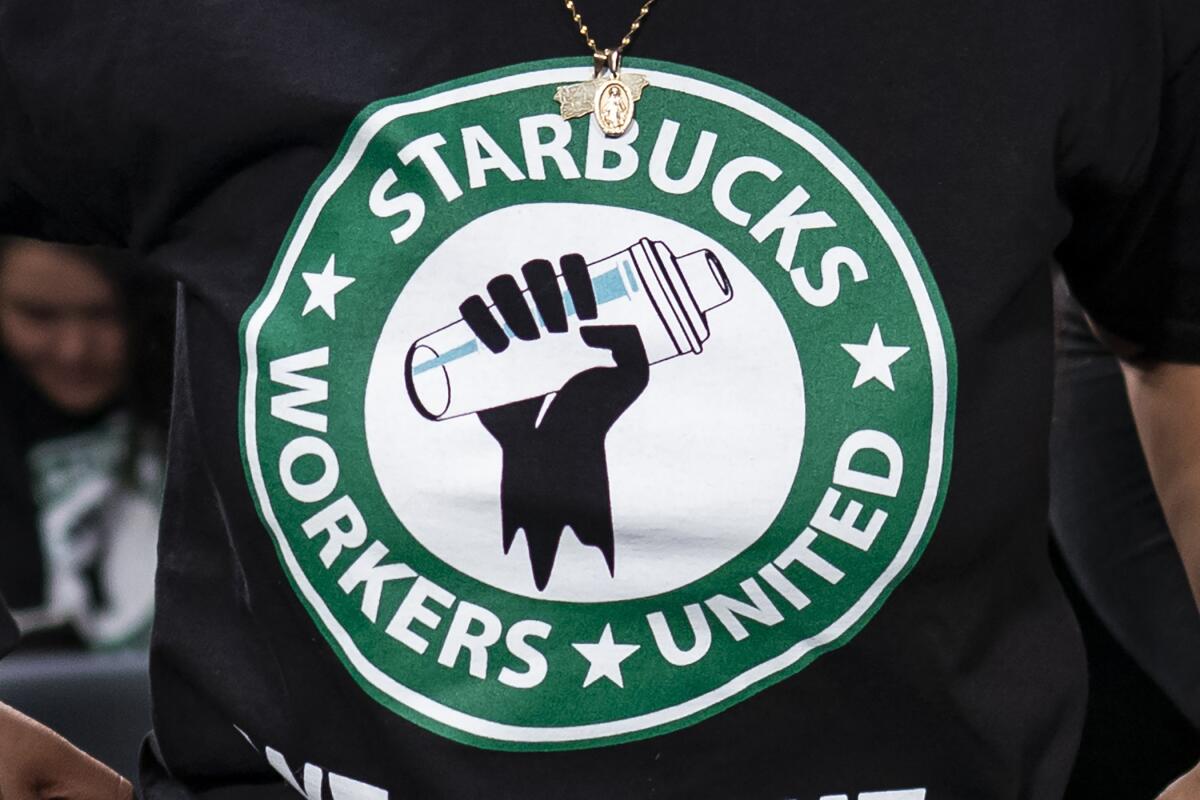As Starbucks CEO, Howard Schultz violated labor law with barb at Long Beach barista, labor board finds

- Share via
In April 2022, a Starbucks barista and union organizer was invited to meet with the company’s upper management in Long Beach. During the meeting, the employee raised several concerns, including charges of unfair labor practices the company faced.
Howard Schultz, who had just begun his third stint as the company’s chief executive, became irritated and shot back: “If you’re not happy at Starbucks, you can go work for another company.”
Now, the National Labor Relations Board has found that Schultz acted unlawfully by inviting an employee to quit after they raised issues related to unionization.
The board’s decision, issued Oct. 2, ordered Starbucks to cease and desist from implying employees could be fired for engaging in protected activities such as union organizing. The company must also post a notice of employee rights at all of the Long Beach stores from which employees attended the meeting with Schultz.
In its decision, the board wrote that it has “long held unlawful employers’ statements that employees dissatisfied with working conditions should quit rather than try to improve them through union activity.”
Starbucks did not immediately respond to a request for comment regarding the NLRB’s Long Beach decision, which comes as the coffee chain has changed its stance on unionization efforts.
Until this year, the company had ardently resisted the campaign to organize its workers, which began in 2021. Federal labor regulators found Starbucks repeatedly violated labor laws by disciplining and firing workers involved in unionizing activity, shutting down stores and stalling contract negotiations.
But in February the company announced it had agreed with the union behind the campaign, Starbucks Workers United, to streamline negotiations on contracts and take a more neutral approach when workers at unionized stores took steps to organize.
Earlier this week, the unionization drive reached a milestone, when a store in Washington became the 500th U.S. location to unionize. Starbucks Workers United has credited the company’s new posture for a wave of some 100 Starbucks stores that have unionized since March.

“We’re happy to see the NLRB continue to stand up for workers and our legal right to organize. At the same time, we’re focused on the future and are proud to be charting a new path with the company,” Michelle Eisen, national organizing committee co-chair at Starbucks Workers United and a barista at a Buffalo, N.Y., store, said in an emailed statement about the decision on Schultz’s comment.
Starbucks spokesperson Phil Gee said the company disagreed with the decision, and that sessions such as the one held with baristas in Long Beach and other locations across the country aimed to gather input from workers.
“Our focus continues to be on training and supporting our managers to ensure respect of our partners’ rights to organize and on progressing negotiations towards ratified store contracts this year,” Gee said in emailed statement Friday.
Beyond charges from federal regulators and other fallout from its earlier anti-union approach, the company is grappling with a change in leadership, softening demand, boycotts over its perceived support for Israel, pressures from activist investors and criticism that it has strayed far from its roots with menus of overly complicated items that take too long to serve. Sales in North American stores dipped 2%, and sales in the rest of the world dipped 7%, the company reported in July.
Schultz stepped down last year and in August the company named a new chief executive, Brian Niccol, to replace Schultz’s successor. Niccol has said he’ll stick with the company’s new position on unions.
“I deeply respect the right of partners to choose, through a fair and democratic process, to be represented by a union,” Niccol wrote in a letter addressed to union members and posted on the company’s website last week. “I am committed to making sure we engage constructively and in good faith with the union and the partners it represents.”
Niccol penned the remarks in response to a letter signed by hundreds of workers who serve as bargaining delegates from various stores for the union. The workers reached out ahead of a scheduled bargaining session, the first of Niccol’s tenure.
Still, workers’ views on whether to unionize is not unanimous.
As employees at the store in Washington were voting to join the union, workers at a Starbucks in Hollywood on Monday chose not to join. Also on that day, a store in Salt Lake City failed to secure votes needed to win union recognition.
The NLRB has conducted a total of 602 union elections at Starbucks stores, with 102 of them falling short and 500 passing, according to NLRB spokesperson Kayla Blado. In California, 61 stores have held union elections and 41 of them have had their bargaining units recognized by the labor board.
At the Hollywood store, pro-union workers had been optimistic ahead of the vote count, which came out 14 opposed to unionization to 6 favoring it. The workers had reached out to union officials in February, frustrated by problems of chronic understaffing.
Mikey Martinez, a shift supervisor who has worked at the store for more than five years, said he was fearful when he and co-workers began talking about unionizing. But his initial concerns about backlash dissipated after managers held a meeting about a month ago to explain the company’s new, more neutral stance.
It was “really good to be able to speak about it without checking behind our shoulders to see if anyone is listening,” Martinez said.
More to Read
Inside the business of entertainment
The Wide Shot brings you news, analysis and insights on everything from streaming wars to production — and what it all means for the future.
You may occasionally receive promotional content from the Los Angeles Times.











